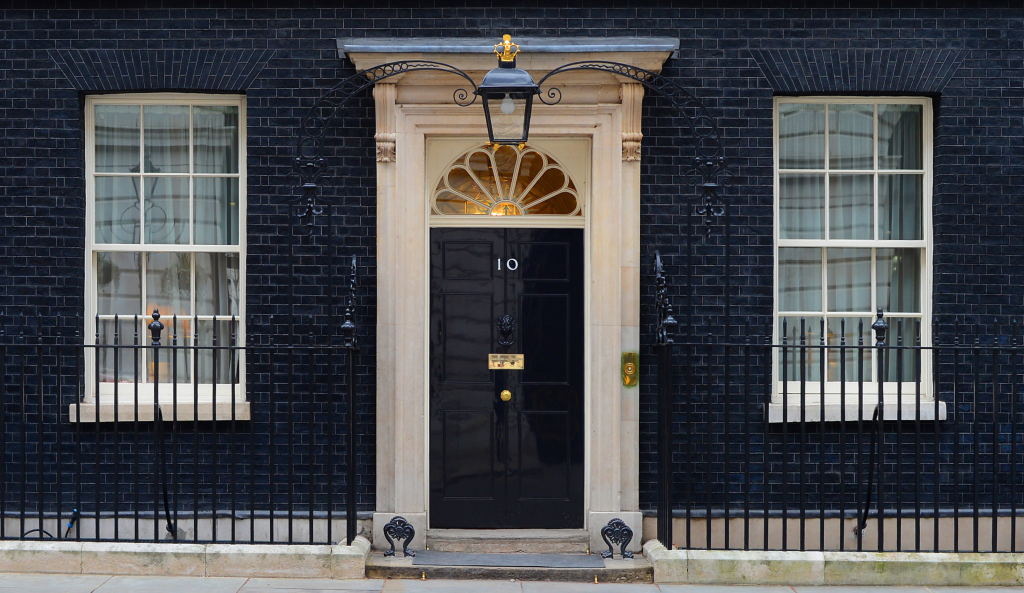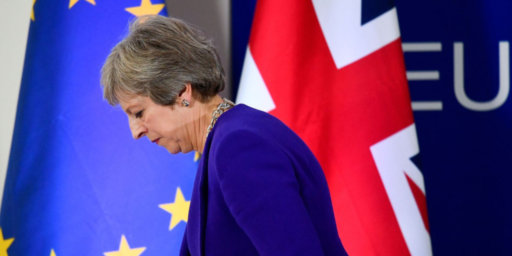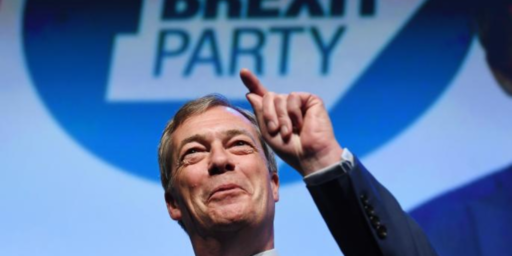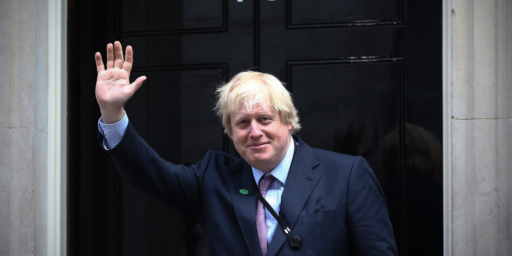Brexit Dispute Leaves British Government In Disarray
With Brexit negotiations proceeding slowly, Theresa May loses her Brexit Minister and, more significantly, Foreign Secretary Boris Johnson, who is likely to become one of her leading critics inside the Conservative Party going forward.

British Prime Minister Theresa May is dealing with a significant rebellion in her cabinet over the progress, or lack thereof, of negotiations with the European Union regarding the United Kingdom’s exit from the E.U.:
LONDON — Boris Johnson resigned as Britain’s foreign secretary on Monday, becoming the second cabinet minister to quit in less than 24 hours in protest over plans from Prime Minister Theresa May to soften the economic impact of British withdrawal from the European Union.
Mr. Johnson’s departure followed that of David Davis, who quit as Brexit secretary late Sunday, and deepens the mood of crisis gripping Mrs. May’s government three days after she thought she had won agreement from her cabinet on a Brexit plan.
The public face of the 2016 campaign that persuaded Britons to quit the European Union, known as Brexit, Mr. Johnson is perhaps the most high-profile advocate of leaving the bloc, and his departure highlights the depth of the bitter divisions in Mrs. May’s government.
On several occasions, Mr. Johnson had appeared to undermine Mrs. May’s strategy, and in comments that were recently leaked, he described her government as lacking “guts,” unfavorably comparing the prime minister’s negotiating style to that of President Trump.
After the surprise resignation of Mr. Davis, Britain’s chief negotiator in withdrawal talks with the European Union, there was an ominous silence Monday morning from Mr. Johnson, who was scheduled to host a diplomatic meeting in London to discuss the western Balkans.
Then, around 3 p.m., Mrs. May’s office issued a statement that said simply: “This afternoon, the prime minister accepted the resignation of Boris Johnson as foreign secretary. His replacement will be announced shortly. The prime minister thanks Boris for his work.”
The pound dropped against the dollar as news of the resignation broke, and Conservative lawmakers appealed to their colleagues not to demand a confidence vote in Mrs. May’s leadership.
Such a move could be set off by just 48 of her party’s lawmakers — although it would take many more to dislodge her. Earlier, Mr. Davis told the BBC that he was not encouraging a challenge to Mrs. May, and ruled himself out as a contender if there were one.
But the resignation of Mr. Johnson reignited the debate just as Mrs. May was hoping that she had restored some stability to the government by announcing that the pro-Brexit minister Dominic Raab would replace Mr. Davis.
Addressing Parliament on Monday, Mrs. May said the options presented so far by European Union negotiators were unacceptable to Britain.
“If the E.U. continues on this course, there is a serious risk it could lead to no deal, and this would most likely be a disorderly no deal,” she said. “A responsible government must prepare for a range of potential outcomes.”
As a result, she said, the cabinet agreed on Friday to step up preparations for such an outcome, although she acknowledged that a sudden, hard exit without any agreements on trade, customs or migration “would have profound consequences for both the U.K. and the E.U.,” and should be avoided.
The resignation Sunday night of Mr. Davis, who was among the members of the prime minister’s cabinet demanding a more complete break from the European Union, known as a “hard Brexit,” revealed the intensity of the split in the cabinet, although he did not appeal to other ministers to follow him.
Mr. Davis said that he could not accept the approach that Mrs. May demanded in the meeting with top officials on Friday, contending that Britain was giving away too much, too easily in negotiations with the union, and that he was leaving his job because he could not, in conscience, argue for the cabinet’s Brexit position in public.
Other members of Mrs. May’s cabinet have been arguing for a “soft Brexit,” which would seek to maintain economic stability by keeping closer ties to the European Union after Britain leaves. Most recently, Jaguar Land Rover and Airbus have expressed concerns about the government’s approach to the negotiations.
Mr. Davis specifically cited concerns about any agreement that would leave Britain in a customs union and the single market.
“The general direction of policy will leave us in, at best, a weak negotiating position, and possibly an inescapable one,” he wrote in a letter to the prime minister that was released publicly. “The cabinet decision on Friday crystallized this problem.”
More from The Guardian:
Boris Johnson has resigned as foreign secretary, becoming the third minister in 24 hours to walk out of the government rather than back Theresa May’s plans for a soft Brexit.
The prime minister hammered out a compromise with her deeply divided cabinet in an all-day meeting at Chequers on Friday but after consulting friends and allies Johnson decided he could not promote the deal.
Pressure on the foreign secretary had been mounting since fellow pro-Brexiter David Davis resigned as Brexit secretary on Sunday night, swiftly followed by his No 2 at the Department for Exiting the EU, Steve Baker.
A Downing Street spokesman said: “This afternoon, the prime minister accepted the resignation of Boris Johnson as foreign secretary. His replacement will be announced shortly. The prime minister thanks Boris for his work.”
Friends said Johnson had been finalising his resignation letter, but Downing Street announced his departure before he had completed it.
After the Chequers summit, it emerged that Johnson had referred to attempts to sell the prime minister’s Brexit plan as being akin to “polishing a turd”.
As the flamboyant public face of the Vote Leave campaign, his departure will deepen the sense of crisis around May, and increase the chances that she could face a vote of no confidence.
One senior Brexiter suggested more resignations could follow if May sticks to her plan for a “common rule book” with Brussels: “They’ll keep going, one by one, until she either junks Chequers or goes.”
Johnson’s resignation was announced on Monday afternoon as Labour MPs were being briefed about the government’s soft Brexit plan by May’s de facto deputy, David Lidington.
(…)
May appeared before a packed house of Commons, cheered loudly by Tory MPs as she arrived in the chamber minutes after news of Johnson’s resignation had emerged. The prime minister acknowledged the resignations of Davis and Johnson at the beginning of her statement on Friday’s Chequers agreement, briefly thanking Davis for steering through the “most important legislation for generations” and Johnson for showing passion in promoting “global Britain to the world”.
The prime minister did not elaborate on the turmoil engulfing her government in detail, saying only that “robust views had been exchanged around the cabinet table, as they have been around the breakfast table”. She added that she now expected cabinet members to conform to collective responsibility now that a soft Brexit policy had been agreed at Chequers.
Other ministers supporting hard Brexit took up their places on the frontbench, including Andrea Leadsom, Liam Fox and Penny Mourdant. Michael Gove arrived late, unable to get a seat on the frontbench initially, before taking a seat on the benches reserved for cabinet members after Corbyn’s speech. But there was no sign of either Johnson or Davis in the chamber.
Speaking after May, Corbyn said there was a crisis in the government, accusing her of presiding over “two years of soundbites, indecision and cabinet infighting” adding that “more and more people [are] losing faith that this government is capable of delivering a good Brexit deal and that is just within her own cabinet.”
Given the fact that these moves come on the eve of both a summit meeting in Brussels and the first-as-President visit of President Trump to the United Kingdom, they are somewhat surprising to the extent that one would have thought that the Cabinet would have wanted to maintain at least the appearance of a united front prior to these events. Apparently, though, the meeting late last week to attempt to resolve the ongoing disputes over whether to continue negotiations with Brussels in the hopes of reaching a deal on a post-Brexit trade deal and other issues or to move forward under the assumption that no such deal will be possible in the short term and go forward with a so-called “hard Brexit” that would leave the United Kingdom without a trade deal with its largest neighbor and face the prospect of going forward without one for a considerable period of time.
In the short term, of course, the biggest question this creates is what it means for Theresa May’s future as both the leader of the Conservative Party and as British Prime Minister. As noted above, it would only take 48 members of her own party to sign a letter to force a vote of no confidence against May in the House of Commons. While it seems likely that May would survive that battle in the short term if only because it’s unclear who would succeed her if she were pushed aside and because it doesn’t appear that there’s much eagerness in Parliament for yet another General Election after the one that took place in 2015 and then the snap election that May called last year that resulted in her losing a gamble that, at first, seemed as though it would solidify her party’s control over the House of Commons. At the same time, the fact that Brexit negotiations are proceeding slowly, and apparently not going well, likely means that May is going to be on unstable ground going forward.
An additional factor that could contribute to future headaches for May, of course, is the fact that Boris Johnson is now outside the government and likely to become the leader of the hard Brexiteers inside the Conservative Party. Johnson has made no secret of the fact that he has his eye on becoming Prime Minister himself someday and keeping him on board as Foreign Secretary was, in retrospect, a smart move on May’s part in that it helped to keep perhaps her most potent political rival under some degree of control. Now that he’s outside the government, though, Johnson will likely feel free to become one of May’s strongest critics inside the Conservative Party and, potentially, a challenger for the leadership of the party should the ongoing Brexit negotiations continue to go as badly as they have been. This could make the next several months in London very interesting to watch to say the least.





We’re not the only country being led by clowns. I suppose that should be a comfort.
Predictable.
Sad thing is us Americans can’t even laugh at the Brits stupidity.
I may be misremembering, but didn’t Boris have a chance at talking the PM post and declined? Wasn’t May like the one who took it because no one else wanted to touch the hot Brexit potato?
Trump and Brexit are essentially the same problem: voters fed on Russian (and UKIP, Tory and GOP) lies made stupid choices. Now both governments are trying to cope with voter failure, and it is proving damned difficult.
Both systems are failing – the Tories can’t figure out how to follow the wishes of idiot voters because what the idiot voters wanted makes no rational sense in the real world. Republicans have ceased to exist and are reborn as a cult of personality with an imbecile as their object of veneration, because any attempt at rationality fails in the face of voter failure.
The one thing that is clear is that both the US and UK have been dramatically weakened. Neither is likely to recover anything close to their previous importance and influence in the world. The fault is not in our stars but in ourselves. The British people and the American people failed in their duties as citizens/subjects.
A basic difference is that Trump doesn’t even pretend to care about the country. He’s a petty little thief who sees the presidency as a way to line his own pockets. Other than that he is motivated by rage and revenge.
I’ve been following EUreferendum, which is one of the very few blogs looking at the exact problems involved in detaching the U.K. from the EU. (They want Brexit, but would prefer a version which goes through EEA not to overshock the system.) Their take on the matter is that the U.K. is totally screwed at present–none of the people in government or in the media are actually looking at what will happen if the U.K. crashes out of the EU nor have any of them done any decent analysis of exactly how many regulations have to be adhered to/replaced/worked around.
Between the internal catfighting in the Tory party and the sad-nostalgia of the Labour party, there is nobody with any brains in charge. They’re all acting as if the U.K. is still the strongest country in the world (or at least stronger than the EU), that German auto manufacturers and Italian winemakers will put pressure on their respective governments to come to a sweet deal with the Brits, and that it’s all just a bluff on the EU side anyway.
Eureferendum also believes that the EU has probably made up its mind about the UK already and are starting to plan for the case where the UK accidentally crashes out of the EU with no preparation. And everyone in Europe has gotten so fed up with the U.K.’s antics and acting like a prima donna that they’re resigned to take the financial hit involved with the loss of the U.K. markets.
Basically, the U.K. isn’t as important as it thinks it is–as it will learn, very painfully.
@SenyorDave:
Rage, indeed: A fifty-year rage against haute Manhattan, which would never admit him unto its golden circle. Trump, a spectacularly failed social climber, wants his revenge.
@Yank: Oh sure we can, we just better not take offense when they laugh twice as hard at us.
Trump picked Kavanaugh.
@CSK:
Who cares? Really, what does it matter. He picked whoever kissed his ass the most enthusiastically. He picked whoever he thought would be the weakest, the easiest to intimidate. Nothing else mattered.
@Michael Reynolds:
As I mentioned on the other thread, there are already some shrieks of despair from the religious fanatics over this choice.
@CSK:
Trump doesn’t care about them, he doesn’t care about Roe, he doesn’t care about anything but finding a justice who will aid in his obstruction of justice. He’s not capable of caring about anything but himself.
And he will be confirmed with 100% of Republicans and probably one or two red state democratic senators. There is not a single thing we can do to stop this happening.
Purely hypothetical, and of course widely off topic, if the president were to die after nominating a Supreme Court justice but before they were confirmed by the Senate, would the succeeding VP have a right to withdraw the nominee and nominate his own justice?
There is one–one-very limited way in which i understand a rationale for why Trump happened. The US isn’t a Democracy. It’s an oligarchy. Several studies over the last 5 or so years have shown that there’s essentially no positive correlation between what voters want and what congress does. If you look at what the top 0.1% of incomes want there’s a huge correlation. So I can understand why people think if the system is going to disregard everything they want no matter who they vote for, then fuck it, vote for the loudmouth lunatic who says he hates the system as much as I do. burn it down.
Those of us who do care about the outcome of the vote are focused on things that do matter, but those things are at the margins. Slightly more access to abortion. A slightly higher minimum wage. A fraction fewer toxins dumped into streams. A tiny bit of oversight of the companies that are robbing us blind. The general, overarching process of a few very wealthy people taking more and more of the wealth and leaving everyone else with pennies churns on regardless of whether Dems or Repubs are in power. Maybe trump was the first of many crises. When I heard that Romney’s new louse was largely underground to look less ostentatious, I thought, ‘oh. He senses the pitchforks that are still a few years away.’
@teve tory: For some reason I can no longer give a “Thumbs Up” on this site so I have to say I agree with you. You put in words what I’ve been thinking but couldn’t articulate; we are at the margins.
@teve tory:
In every regime since Hammurabi there have been perfectly compelling rationales for the ‘burn it all down’ approach. Trump voters aren’t mad at oligarchs, they’re mad at change. They’re mad because even though they studiously avoid saying ‘ni–er’ they’re seen as racist. They’re mad because boys are turning into girls. They’re mad because most of the country thinks they’re head cases for obsessing over guns. They’re mad because the atheists have escaped their cages and Christianity is ‘under siege’ from secular and Muslim forces.
They’re dinosaurs looking up at the asteroid and they are scared because the world has changed, and much of that change has resulted in a perceived loss of status. The number of groups they can feel superior to is dwindling rapidly. Why, it’s as if they’re no better than gays or black people or immigrants!
The system, the ‘deep state,’ the ‘elites,’ all of that is just labels handed to them by their manipulators. What matters is that they aren’t special any more. That is why instinctively they love Trump, because they know he’s a vulgar buffoon rejected and excluded by all the cool kids. Just like them.
@Kathy:
Boris has always been more entertainer than anything else. He wasn’t really seriously positioned.
@Michael Reynolds:
Remain suffered badly from a very poor prep of the actual referendum and its framing, Cameron being a fool and not realising the fire he was playing with. A better framed and structured referendum also fully addressing the United Kingdom and not just England components would have not passed.
Late to this as ever but:
This isn’t quite right; letters from 48 to Chair of 1922 Committee would force an internal Conservative Party leadership vote.
May would win that if she got a majority of Conservative MP’s, which she IMHO probably would; the hardline Brexiteers don’t have the numbers, and Johnson’s former personal following has mostly evaporated.
Even the ERG (the Parliamentary Brexiteer party-within-a-party) are fully aware that Boris is only ever concerned with what’s good for Boris; nobody at Westminster trusts him now.
ERG could try coercing some “moderates” via the headbangers in the constituency parties. Johnson & Davis might just be an aid to them there; Johnson probably still has a following in the party at large; mainly because lot of Conservative constituency activists make an average lump of sedimentary limestone look quite the intellectual fellow.
But a lot of Remain/SoftBrexit/May loyalist Conservatives have I suspect
(1) had a bellyful of Brexiteer fuckwittery and
(2) are getting their ears bent behind closed doors by constituency businessmen screaming in rage and fear over the truly apocalyptic consequences of “No Deal” and the merely catastrophic ones of a Canada/EU type FTA; and are fully in a mood to tell the ERG and activist headbangers to take their threats of deselection and shove ’em.
It boots little to be a candidate if the party were to be annihilated post-Brexit anyway. And less still if the country is a smouldering wreck.
Of course, Labour could then try to force a Commons vote of no confidence. Then the question is, do the ERG rebel? If they do then it’s full on Tory internal war.
The Commons numbers mean an Opposition/ERG vote could defeat the government BUT with the fixed term act that would NOT automatically mean a fall of govt. or general election.
Lots of possibles from that point on, but basically (if I have the legalities straight here) if govt. does NOT give up and call an election, then Opposition & ERG would need to co-operate to force through repeal of fixed terms. Would ERG be prepared to risk that? Could Corbyn discipline his anti-Brexiteers to stomach it?
At present Conservatives and Labour are still (amazingly) about level in polls; but a full-on Tory split would surely edge Labour ahead, Corbyn notwithstanding, and gawd knows how the various flavours of leaver votes would break in that sort of scenario.
I doubt ERG have the nerve to follow that path to its conclusion.
And Corbyn has to be careful as well; his Parliamentary Party loves him not.
But what do I know. I thought Remain would win the referendum. 🙁
(Thank you so very, very much David sodding Cameron.)